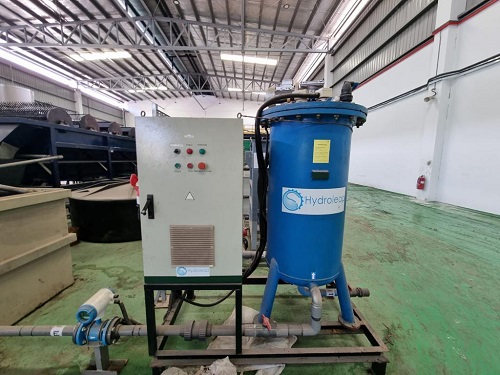SINGAPORE, January 29, 2024 – Wastewater management technology isn’t just about treating water efficiently; it’s a pivotal step towards a more sustainable and environmentally conscious future. By significantly reducing carbon emissions through innovative solutions, industries can reduce their carbon footprint in the global push towards a greener tomorrow.
Hydroleap, a Singapore-headquartered deep-tech water treatment company, is reimagining the way the world is looking at water and wastewater. It provides innovative, chemical-free, high-performance, and modularized electrochemical technologies that can replace conventional chemical and energy-intensive processes. Led by Dr. Mohammad Sherafatmand, CEO & Founder, the company was established about seven years ago, propelled by a vision to redefine water and wastewater management.

CarbonWire caught up Dr Moh for a conversation to understand how they are working towards transforming an industry deeply rooted in traditional methods. Offering a suite of benefits to industries, Hydroleap is enabling up to 95% reduction in operating man hours, 100% reduction in chemicals, and 30% savings in the cost of ownership. Hydroleap’s customers include the Public Utilities Board – Singapore’s water agency, Universal Robina Corporation, one of the largest branded consumer food and beverage product companies in the Philippines, one of Asia’s largest diversified real estate groups headquartered in Singapore, and a renowned blue-chip data center. The current customers base is Southeast Asia specifically Singapore, Indonesia, Philippines and Thailand.
Dr Moh’s has had a lifelong passion for water, nurtured by childhood experiences in regions plagued by water scarcity. This innate interest, coupled with a familial involvement in the water business, steered the founder towards a scientific pursuit—a PhD in water and environmental engineering.
It was during this academic journey that he was struck with the realisation that a significant gap existed between scientific advancements and their practical application in industrial water treatment. This realization prompted the establishment of Hydroleap, aiming to bridge the divide between theoretical innovation and real-world industrial implementation.
The crux of Hydroleap’s mission lies in offering innovative, chemical-free electrical treatment solutions tailored for industries. Traditional methods reliant on chemical and energy-intensive processes prompted Hydroleap to introduce sustainable alternatives that not only alleviate environmental impact but also offer tangible financial benefits to clients.
Core Technology
At the heart of Hydroleap’s solutions lies an innovative approach called Advanced Electrochemical Treatment (AET). Unlike conventional methods reliant on chemical-intensive processes, AET operates by leveraging the power of electrodes submerged in water or wastewater. These electrodes, when powered, catalyze reactions that effectively remove contaminants, eliminating the need for harmful chemicals and significantly reducing energy consumption in the treatment process.
Chemical-Free Treatment: One of the primary contributors to carbon emissions in conventional wastewater treatment is the use of chemicals. Hydroleap’s AET technology eliminates this reliance on chemicals, thereby drastically reducing the carbon footprint associated with their clients’ wastewater treatment processes. By substituting chemical treatments with electricity-driven solutions, Hydroleap ensures a greener, more sustainable approach to wastewater management.
Energy Efficiency: Conventional treatment processes often require substantial energy consumption, leading to increased carbon emissions. Hydroleap’s AET technology operates at significantly lower power consumption levels, making it highly energy-efficient. This reduced energy demand translates directly to lower carbon emissions, offering a more environmentally friendly alternative for industrial wastewater treatment.
Reducing Discharges and Carbon Footprint: Hydroleap’s solutions bring tangible reductions in water discharges and overall carbon footprint for its clients. For instance, in data centers, where water-intensive cooling systems are prevalent, Hydroleap’s technology has enabled reductions in water discharges by up to 70-80%, directly impacting the associated carbon footprint. By treating water more efficiently and effectively, the company contributes to substantial environmental benefits, aligning with global sustainability goals.

“We are focussed on expanding Hydroleap’s footprint globally, addressing water challenges in Southeast Asia, and extending operations to Australia and Japan. Additionally, the company also aims to venture into the palm oil industry, a significant contributor to environmental challenges, by providing efficient wastewater management solutions,” Dr Moh added.
In July 2023, Hydroleap announced raising US$ 4.4M in Series A funding. It was led by Japanese Venture Capital firm Real Tech Holdings and joined by a mix of new and existing corporate investors such as Mitsubishi Electric, Seeds Capital, Wavemaker Partners, New Keynes Investments, as well as the State Government of Victoria in Australia.